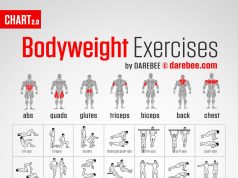In the vast landscape of dietary advice and fitness fads, one age-old question persists: is counting calories truly the cornerstone of successful weight loss? For decades, individuals seeking to shed pounds have meticulously logged every bite and sip, wielding calorie-tracking apps like modern-day compasses guiding them through the wilderness of weight management. Yet, as nutritional science evolves and new dietary philosophies emerge, the necessity of this numerical vigilance is increasingly called into question. This article delves into the heart of this debate, exploring whether calorie counting is an indispensable tool for achieving weight loss or merely one of many paths to a healthier self. With a balanced lens, we examine the evidence, weigh the alternatives, and consider the complexities of a practice that is as personal as it is scientific.
Understanding the Science Behind Calories and Weight Loss
In the quest for weight loss, understanding the role of calories is pivotal. Calories, essentially units of energy, fuel our bodies much like gasoline powers a car. When we consume food, we are ingesting calories that our body uses for everything from maintaining heartbeat to powering a sprint. However, the relationship between calorie intake and weight loss is nuanced. A calorie is not just a calorie; the source of these calories—whether from fats, carbohydrates, or proteins—can significantly influence how they are processed by our body. This is where the science becomes intriguing, as it reveals that not all calories have the same impact on our body’s metabolism and energy expenditure.
Here are some key factors to consider:
- Metabolic Rate: Your basal metabolic rate (BMR) dictates how many calories your body needs at rest. A higher BMR means more calories burned without extra effort.
- Caloric Density: Foods with low caloric density, like fruits and vegetables, allow for larger portions with fewer calories, aiding in satiety and weight management.
- Macronutrient Composition: The balance of proteins, fats, and carbohydrates can affect how full you feel and how your body uses energy.
While counting calories can provide a structured approach to weight loss, understanding these underlying scientific principles may offer a more holistic view, enabling individuals to make informed dietary choices beyond the numbers.

Balancing Nutrition and Calorie Counting for Effective Results
Striking the right balance between nutrition and calorie counting can be a game-changer in your weight loss journey. While counting calories provides a quantitative framework to ensure you are consuming less energy than you expend, it’s equally vital to focus on the quality of the calories you consume. Prioritizing nutrient-dense foods can help you feel full and satisfied, making it easier to maintain a calorie deficit without feeling deprived.
- Choose whole foods: Opt for fruits, vegetables, whole grains, and lean proteins to get the most nutritional bang for your calorie buck.
- Mindful eating: Pay attention to hunger cues and enjoy your meals without distractions to better regulate intake.
- Balance macronutrients: Ensure a good mix of carbohydrates, proteins, and fats to support overall health and sustain energy levels.
By integrating these practices, you can enjoy a more holistic approach that not only supports weight loss but also promotes overall well-being. This balanced method allows for flexibility, which can help you maintain your progress in the long run.

Exploring Alternative Approaches to Traditional Calorie Counting
In recent years, many have begun to question the effectiveness of calorie counting as the cornerstone of weight management. As a result, several alternative methods have emerged, offering fresh perspectives on achieving a healthier lifestyle. These approaches often emphasize holistic well-being rather than strict numerical tracking, aiming to cultivate a more sustainable relationship with food.
- Intuitive Eating: This approach encourages individuals to listen to their body’s hunger cues and eat accordingly. By fostering a connection with one’s internal signals, it promotes a more mindful eating experience, reducing the stress often associated with calorie counting.
- Mindful Eating: Centered around the practice of being fully present during meals, mindful eating helps individuals savor their food, leading to greater satisfaction and a natural regulation of intake.
- Quality Over Quantity: Focusing on the nutritional quality of food rather than its caloric content can lead to healthier choices. This method advocates for a diet rich in whole foods, emphasizing nutrients and their benefits.
While these methods may not offer the precision of calorie counting, they provide valuable frameworks for those seeking a more balanced and less restrictive approach to nutrition and weight management. Each individual’s journey is unique, and exploring these alternatives may uncover new paths to health and well-being.

Practical Tips for Mindful Eating and Sustainable Weight Management
Embarking on a journey toward healthier eating and effective weight management doesn’t always necessitate meticulous calorie counting. Instead, cultivating a more mindful approach can lead to sustainable results. Mindful eating involves paying attention to the body’s hunger cues and savoring each bite, allowing for a deeper connection with food. This practice encourages individuals to focus on the quality of food rather than just the quantity.
- Prioritize Nutrient-Dense Foods: Opt for whole grains, lean proteins, and colorful fruits and vegetables, which offer essential nutrients and keep you satisfied longer.
- Listen to Your Body: Eat when you’re genuinely hungry and stop when you’re comfortably full, tuning into your body’s natural signals.
- Practice Portion Control: Use smaller plates and bowls to help control portions naturally, without the need for precise calorie measurements.
- Embrace Slow Eating: Take your time to chew thoroughly, which can improve digestion and enhance the enjoyment of your meals.
These strategies can be seamlessly integrated into daily life, fostering a balanced relationship with food that supports long-term health goals. By focusing on mindful eating habits, you may find a more fulfilling and sustainable path to managing weight without the constant stress of calorie counting.






























